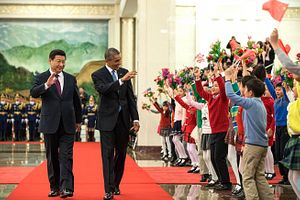The first formal meeting of the Asian Infrastructure Investment Bank (AIIB) will be held sometime in mid-June. This is the moment when its somewhat abstract current nature will start to move toward more concrete actuality. At the moment, the Chinese-led AIIB, with its 57 members, has been a grand idea in search of practical form. Starting in June, the bank will start to focus on doing what it was ostensibly set up to do — investing in core assets in the world’s most dynamic region.
There are three broad scenarios for how the AIIB tale might unfold. Each of them will pose challenges for the United States in particular, as the most vocal skeptic about the AIIB venture. Whether the bank fails or succeeds, the world is a different place now that it exists.
The first scenario is that the bank proves, quickly, to be a success. The naysayers who wondered about its ability to conform to high standards of governance and transparency will see an entity operating entirely in line with international norms, and fulfilling a hugely important function. In this scenario, the AIIB will be challenge one of the stronger arguments used by supporters of the “China threat” theory, particularly in the United States. It will give powerful evidence that China is a status quo power, that it is able to play the international game according to rules largely laid down by others, and that it can show real leadership and work with other countries. This would be a huge fillip to China’s soft power credentials and a problem to those who constantly accuse it of holding more nefarious motives.
The second scenario is that the bank quickly shows it is unable to operate, and that it was far too ambitious and bold an idea for a latecomer to the finance sector like China to contemplate. The 56 other partners will show vocal antipathy and the whole project’s failure will fall like a gift to those who dislike China’s prominence and feel that it is existentially unable to operate according to global standards. The downside of this scenario however, even for the U.S. hardline opponents and skeptics, is that the major economy in the world’s most critical growth area, where there is a projected $8 trillion in infrastructure needs, is unable to optimally contribute where help is most needed. It would mean that China’s knowledge of developmental economics would not be translatable and easily usable outside its own country. This would be a depressing outcome, and in the long term, a bad one for the region and the world.
The third scenario is simply that nothing happens. The AIIB becomes another sclerotic bureaucracy lined up with many others, mired in politics, stymied by internal divisions, and a monument to China’s love of soothing rhetoric over real action. Skeptics win in this scenario too, up to a point, but once more its long-term meaning is good for no one. This outcome would mean that in a hugely important and visible initiative, in which the Chinese leadership have invested enormous political capital, they are exposed in the end as people who cannot execute what they promise. Doubts will start to creep from this into their success in domestic policy, where, once more, they have said a lot, but so far done little. We would be increasingly inclined to see an inactive AIIB as representative of Chinese leaders who talk big, but can’t follow through. In view of how much now depends on these same leaders steering the Chinese economy to a stable, sustainable condition for the region and the world, this is also not a good result for anyone.
Looking at these three broad scenarios, there’s one more conclusion to be drawn: the United States gets far more from being involved — and making sure the bank succeeds — then from staying outside. A successful AIIB with the U.S. eventually joining in means no more than a bit of hurt pride for Washington. But after enduring this, the United States can bask in reflected glory by being associated with a successful and much-needed project, which Washington can argue it made work. A failed bank, or an inactive, empty one, is not in the United States’ or anyone else’s long term interests.
Whatever the outcome, initiatives like the AIIB are not likely to go away as China seeks to play a role in the wider world to support its own interests. The key thing now is to align those projects as much as possible with the interests of others. The AIIB is a real opportunity to do this, in an area where success is easy to deal with, and failure in fact a problem for everyone. The United States should now plot its way in and play a role. It really has nothing to lose.

































